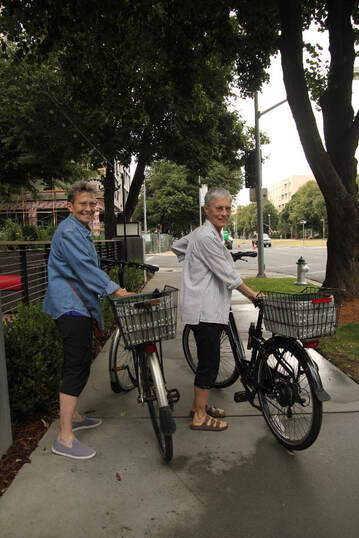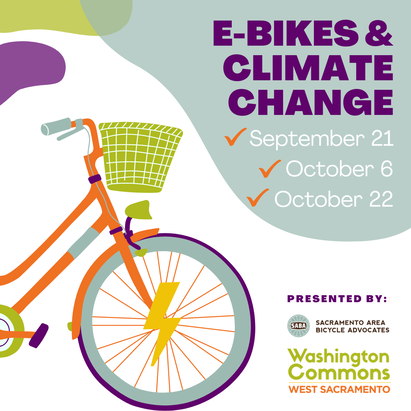now put those two together – we can have fun and make an important contribution to reducing climate change emissions. We learned about the City of West Sacramento’s existing bicycle network and plans for future improvements. Washington Commoners will have a great place to ride their bikes! We learned that it’s a great time to buy an e-bike. The newer ones are lighter due to smaller more efficient batteries and motors. They include advanced computer technology and apps to help us navigate and track our progress. We learned a little about the law. The California Vehicle Code (CVS) section 312.5 defines 3 classes of e-bikes:
We learned the key aspects of e-bikes to help us select our own transportation. Very likely, we’ll select bikes useful for getting around town easily and safely –comfort bikes are easy to ride about town; cargo bikes are for hauling; and three wheelers (trikes) are for those with balance concerns.  We learned about types of electric pedal assist:
We learned about e-bike batteries: Many modern e-bikes have the motor built into the crank area where you pedal (mid-drive). This provides good weight balance and integrated wiring. Some have the battery and motor on the back wheel hub (hub drive). This allows any traditional bike to be used as an e-bike and can offer regenerative braking.
We learned how to choose a great E-Bike:
A final thought from Peter Jacobsen, one of our presenters: “Bicycles are the most efficient land transportation humanity has ever invented, so implementing measures to increase bicycle usage is a good thing for society’s overall energy use.” “This is the way to keep your mobility – and enjoy doing it – without using a car!” Darell Dickey said. Thank you to Peter, Darell and all of our presenters: Steve Rosen, Ken Bradford, Arlete Hodel and Jonathan Burke. We learned and we were inspired! Washington Commons Cohousing & SABA Deb Banks, SABA & Anne Geraghty, Washington Commons If you'd like to find e-bike dealers in Sacramento, Davis or Folsom, check out our curated list!
0 Comments
Leave a Reply. |
Archives
June 2024
|


 RSS Feed
RSS Feed